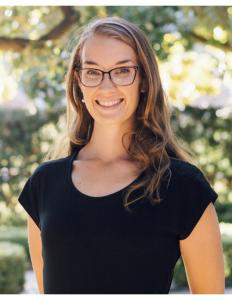 I’m pleased to be able to welcome Dr. Katherine Goodwin Lindgren back to the Anxious Bench today! Dr. Goodwin Lindgren is Assistant Professor of Women’s and Gender Studies at Hope College (Holland, MI). A historian of women and gender in Christianity, her research focuses on the intersections of gender, theology, and religious cultures of late medieval and early modern women. Her dissertation, “Praying with Syon: Compilation, Community, and Vernacular Theology” considered the hidden ways women contributed to theological production during the early English Reformation. She has been a guest contributor for the Anxious Bench, has published in the Journal of Church History and Religious Cultures, and has a forthcoming publication with Christian History magazine.
I’m pleased to be able to welcome Dr. Katherine Goodwin Lindgren back to the Anxious Bench today! Dr. Goodwin Lindgren is Assistant Professor of Women’s and Gender Studies at Hope College (Holland, MI). A historian of women and gender in Christianity, her research focuses on the intersections of gender, theology, and religious cultures of late medieval and early modern women. Her dissertation, “Praying with Syon: Compilation, Community, and Vernacular Theology” considered the hidden ways women contributed to theological production during the early English Reformation. She has been a guest contributor for the Anxious Bench, has published in the Journal of Church History and Religious Cultures, and has a forthcoming publication with Christian History magazine.
“It’s time to start doing the right things.”
On October 3, survivor and activist Tiffany Thigpen challenged viewers of “For Our Daughters” to take action against sexual abuse in the church. The documentary (free and available since September 26th) is based on Kristin Kobes Du Mez’s Jesus and John Wayne and follows the stories of four survivors of sexual assault in the Southern Baptist Convention (SBC). After the first public screening for a packed audience of college students and community members at Hope College’s Knickerbocker Theatre, survivors Cait West and Tiffany Thigpen were joined by producer Kristin Kobes Du Mez, director Carl Byker, and pastor Len VanderZee to discuss the importance of telling these stories, as well as the implications for American Christianity and society.
The release of “For Our Daughters” came just a week after the New York Times ran a much-discussed article from Ruth Graham that covered a phenomenon in the history of American Christianity: for the first time in white evangelical spaces, men outnumber women. Covering the growth of Grace Church – an SBC congregation in Waco, TX – the article outlines a phenomenon among Gen Z that bucks historical precedent “assumed to be a given” that women are and always have been a majority population of Christian congregations.
There is good evidence behind this assumption. Scholars of Christianity, from its earliest days in the Greco-Roman world to the modern era, have shown how women were key to establishing, supporting, and leading these new religious communities. The story of Christianity is inseparable from the story of women in the church. In a groundbreaking article, titled “Women’s History is American Religious History,” historian of women and religion Anne Braude writes, “In America, women go to church.” So what to make of this trend that (notably white evangelical) women are going to church less? Opinions abound, but Graham’s article offers some insight that is further supported by the stories presented in “For Our Daughters”: a lack of toleration of abuse in the church and an accompanying disillusionment in light of the hypocrisy from leaders and fellow believers who claim to “protect women” without taking responsibility for the harm done to women in the church.
This historic anomaly coincides with another phenomenon: Gen-Z women outnumber men on college campuses across the nation. In light of the stories of the women in “For Our Daughters,” young women leaving the church, and the increase in female enrollment in higher education (including Christian colleges), I wonder: could Women’s and Gender Studies help disillusioned daughters (and sons) reckon with abuse in Christian spaces and – perhaps – build more faithful communities?
In 2015, Kobes Du Mez and other scholars argued for a “tradition of Christian gender studies” that not only gives greater clarity to the past of the faith, but provides tools and insight for understanding its present and looking toward its future. But what might this tradition look like?
Here are four examples of how the methods, theories, and goals of Women’s and Gender Studies can help us better understand how to live as Christians in this historical moment:
- Resist oppression of others using wisdom and love.
A classic text of feminism is bell hooks, Feminism is for Everybody. In it, hooks presents a concise definition of feminism: “feminism is against sexism and sexist oppression” and promotes a politics of “wisdom and love.” While action and arguments against sexism vary significantly, I think this definition offers a way of understanding how to foster faithfulness to the great commandment – to love God and love our neighbors (Matt. 22: 34-30). Scripture has plenty to say about sexism, oppression, and wisdom – not to mention love. From Eve to the Virgin Mary, Mary Magdalene, Junia, and Philip’s daughters (to only name a few), Scripture shows how God upends gender hierarchies that support sexism.
In her new book, The Mary We Forgot, Jennifer Powell McNutt calls for a “hermeneutic of surprise” that opens our eyes to the ways God does the unthinkable by elevating the downcast and disregarded by making them messengers of the gospel. God is against the sexism that silences women when they try to speak the truth about how God’s people should act in light of Christ’s saving work.
- See from the Standpoint of the powerless.
“My soul magnifies the Lord…He has brought down the powerful from their thrones, and lifted up the lowly; he has filled the hungry with good things, and sent the rich away empty” (Luke 1:46; 53). Mary’s song of praise to God after the angel Gabriel tells her of her role in the salvation story, one that gives power to the disempowered by showing them the limits of those in authority. Put differently: God gave the young woman from a minority group the power of knowing that God was about to change everything through the child she bore. Her song reflects one of the foundational theories of WGS: Standpoint Theory.
Put simply, Standpoint Theory reminds us that the experiences, voices, and insights of the ignored in fact are sources of truth. The Bible is full of examples of how those on the margins had greater insight to faith and knowledge of God: Tamar held Judah accountable to his sin against her. Ruth and Naomi activated ancient religious codes for their protection. Hagar, the rejected slave of Abraham and mother of Ishmael, gives us a name for God: The One Who Sees. Standpoint Theory gives us the tools to “see” more clearly by sharing the perspective of those on the margins – those who have been harmed by our communities and churches – and stand with them in faith, and speak the truth: God lifts up the lowly and casts down the proud.
- Recognize personal and communal sin and seek to live more justly.
The first of Martin Luther’s 95 Theses states that “the entire life of the believer [is] to be one of repentance.” True Christianity recognizes individual and corporate sin, repents, seeks healing and restoration with God and neighbor. We are bad at this, and prefer the emotionally satisfying scripts of apology rather than the hard work of true repentance. Rachel Denhollander – survivor, lawyer, and participant in “For Our Daughters” – rightly identifies this reality when describing the celebration of pastors who have abused women when they “confess” their behavior without fully lamenting and repenting of own abuse of power.
The prophet Amos paints a more direct picture of the performative sacrifice that neglects to fully address the sin in ourselves and our systems of power:
“I hate, I despise your festivals, and I take no delight in your solemn assemblies. Even though you offer me your burnt offerings, I will not accept them…But let justice roll down like waters, and righteousness like an ever-flowing stream.” (Amos 5:21-24, NRSV).
It seems like God is calling us to more honest awareness of our sin. By failing to be truly honest about the sin and failing to hold seemingly penitent leaders accountable, we perpetuate broken systems that create “interlocking systems of oppression” (like sexism and racism) that promote unjust power and permit harm against those who fall between the cracks. This is where the concept of intersectionality can help us understand how an individual’s sin is part of a larger system that devalues some, protects others, and ultimately escapes the call of the Christian to true repentance – the kind that is not neat and tidy but highlights the depth of personal and communal brokenness that is baked into many churches.
- Believe in a future free from abuse and lived in unity and at peace.
Women’s and Gender Studies is motivated by a feminist hope that our communities can become unified, just, and loving. While this vision has been criticized by Christians for its presumed rejection of God, that need not be the case. After all, Christians live in the hope that Christ will return and make all things new. In Revelation, we see this telos in the perfected city of God, where there is a tree whose leaves “are for the healing of the nations” and where God will “wipe every tear from their eyes” (Revelation 21:1-5; 22:1-15). Oppression, abuse of power, and violence will cease. The wounded will be healed and see justice; the unjust will be judged by just and merciful God. All will be gathered together in unity and wholeness. Or as Julian of Norwich wrote, “All manner of things shall be well.” Christians are called to live in this hope that God will heal all things, and are called to live out this hope in word and in deed. The prayer “on earth as it is in heaven” is both a far of hope and a present imperative for the Christian. This impulse can embody the best virtue of feminism as it is mediated through a faithful WGS education – the hope that a community of love, healing, justice, and peace is in fact real, and is in fact our home.
Neither Tiffany Thigpen or Cait West are part of a church anymore. Their experiences of abuse and defamation at the hands of church leaders and communities makes it difficult to trust or belong to “the household of God.” During the post-screening discussion, Thigpen shared that it was the “first time” she had been in front of an audience that met her with humility and love rather than open hostility and hatred.
This should not be.
If the church will not listen to the truth that survivors of abuse tell us about our failures to love, perhaps a Christian Women’s and Gender Studies curriculum can. If young women are leaving the church because they see these Christian values being contorted to justify abuse, harm, and willful ignorance of sin, perhaps concepts like Standpoint Theory and Intersectionality can help them live out God’s design for women and men: to love the Lord our God with all our heart, mind, soul, and strength. Perhaps Women’s and Gender Studies can give our daughters and sons the tools and space they need to dismantle oppression, listen to the silenced, repent of failure, and live out the faith that all will be made well.
Perhaps it is time to start doing the right things.













